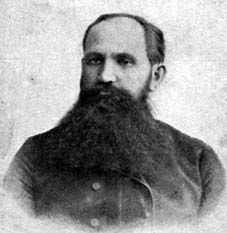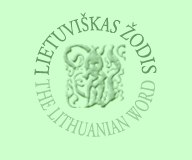 Petras
KRIAUClUNAS, (1850-1916), educator, active participant in the
renaissance of Lithuanian nationalism, born in Papeckiai, county of
Vilkaviskis, on Sept. 16, 1850. He studied at the Theological Seminary of
Seinai and at the Theological Academy of St. Petersburg, Russia, graduating
in 1880 with a candidate's degree in theology, but he did not enter the
priesthood. In 1881 he gained a teaching diploma in classical languages from
the University of Warsaw and was appointed a teacher at a high school (gymnasium}
in Marijampole. He taught Latin, Greek, German, and Lithuanian. Although
Lithuanian language classes were not mandatory, he attracted many students
with his lectures on Lithuanian culture and by his patriotism. From among
the 80 of his
Petras
KRIAUClUNAS, (1850-1916), educator, active participant in the
renaissance of Lithuanian nationalism, born in Papeckiai, county of
Vilkaviskis, on Sept. 16, 1850. He studied at the Theological Seminary of
Seinai and at the Theological Academy of St. Petersburg, Russia, graduating
in 1880 with a candidate's degree in theology, but he did not enter the
priesthood. In 1881 he gained a teaching diploma in classical languages from
the University of Warsaw and was appointed a teacher at a high school (gymnasium}
in Marijampole. He taught Latin, Greek, German, and Lithuanian. Although
Lithuanian language classes were not mandatory, he attracted many students
with his lectures on Lithuanian culture and by his patriotism. From among
the 80 of his
more notable students, about 30 were eventually members of the parliament of
independent Lithuania, ministers of government, and university professors.
Due to his patriotic activity, plus support and circulation of the banned
Lithuanian press, in 1887 he was dismissed from his high school teaching
position. During 1889-1899 he was a judge in Ploksciai, where he cared for
the ailing writer Vincas Kudirka. Kriauciunas kept in close touch with other
Lithuanian activists and with foreigners who were interested in the
Lithuanian nation, its language and culture. In Ploksciai his residence was
frequented by the Russian philologist Aleksander I. Aleksandrov, the Polish
linguist Jan N. Baudouin de Courtenay, the Danish writer Aage Benedictsen,
the Finnish ethnologist Aukusti Niemi, and the Finnish linguist Josepi
Mikkola and his wife
Maila Talvio, a Finnish writer. In defense of the Lithuanian press
prohibited from publication at that time in Latin letters, Kriauciunas read
a lecture in 1895 to the philologists' society at the University of St.
Petersburg, demonstrating that the Russian Cyrillic alphabet was not suited
to the Lithuanian language. He argued that it did not contain enough
characters to encompass the phonetics of Lithuanian. In addition, on the
question of the ban of the Lithuanian press, he presented a lengthy paper to
the Warsaw Board of Education which governed southern Lithuania. Because of
further patriotic activity, Kriauciunas was forced to withdraw from his
judgeship in 1899. During 1900-1905 he practiced law in Marijampole, while
from 1906 he resumed his high school teaching in that same city. At the
outbreak of World War I his school was evacuated in 1915 to Yaroslavl',
Russia, where he died on January 20, 1916.
Kriauciunas was a man of great erudition. He could speak and write eight
languages, was an expert on the Lithuanian language, and possessed an
extensive philological library. Nevertheless, in the footsteps of his former
teacher, philologist Kazimieras Jaunius, Kriauciunas had a disdain for
writing. He collected Lithuanian folklore and contributed material to the
dictionary of Antanas Juska. He intended to compile his own dictionary and
grammar of the Lithuanian language, but the works were never realized. Thus
his literary legacy if not extensive: a Latin grammar written in Russian,
poetry and prose
translations from various languages, several papers on the Lithuanian
language, and some articles of a patriotic content. Kriauciunas' major
Contribution was his great influence on the Lithuanian youth of his time by
way of his imposing personality and spoken word.
Literature:
ENCYCLOPEDIA LITUANICA I-VI, 1970-1978, Boston

